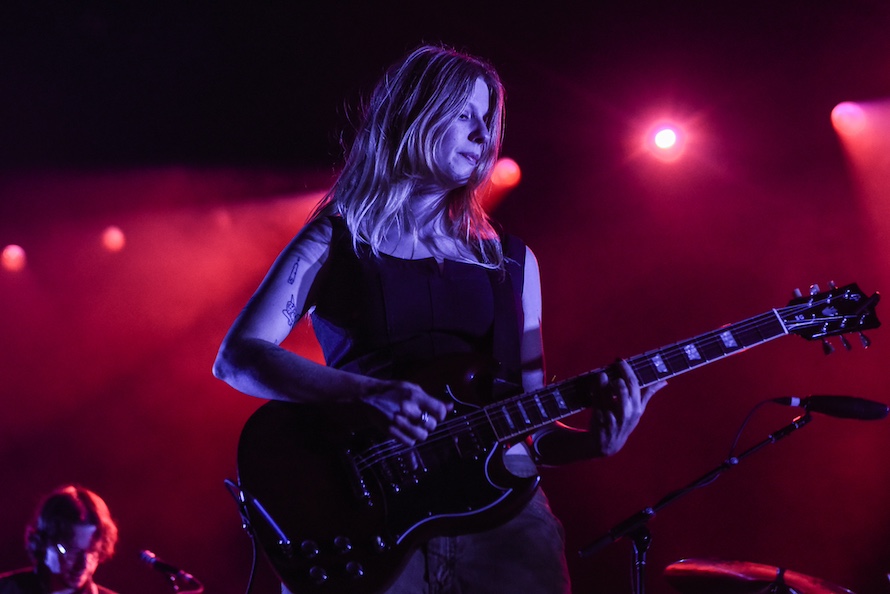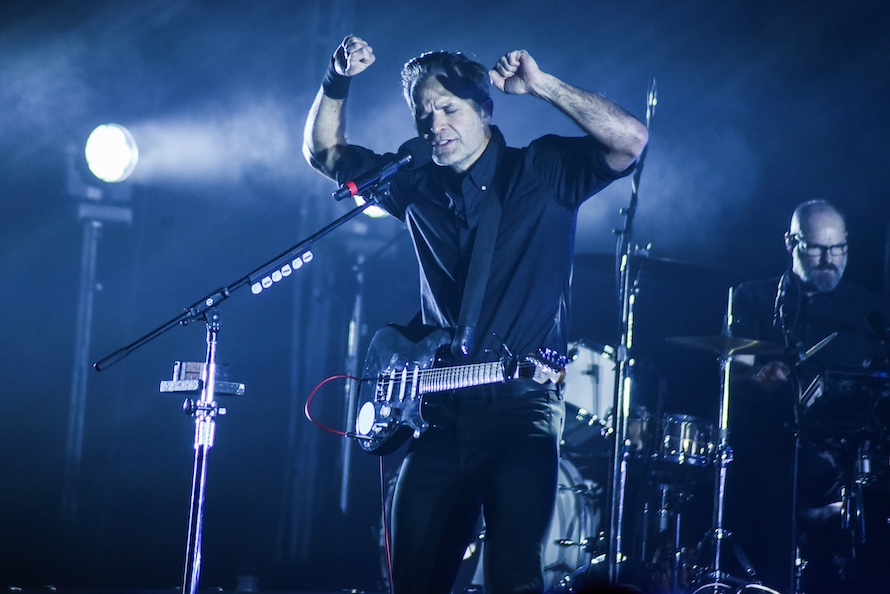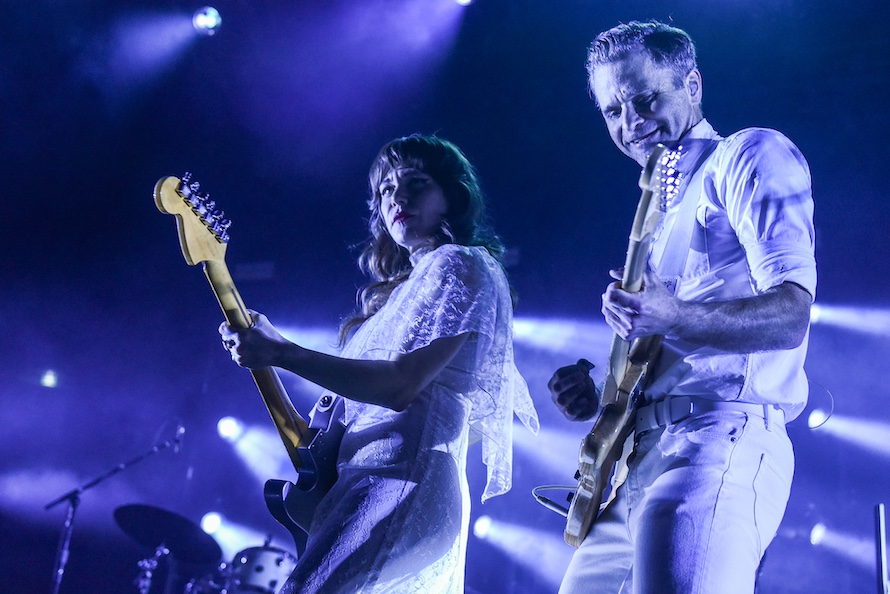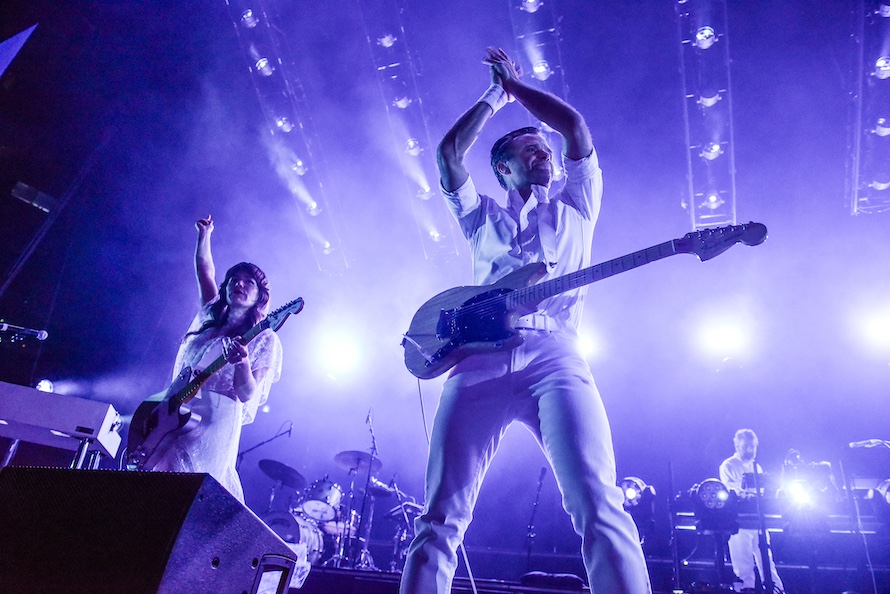Death Cab for Cutie and the Postal Service Looked Perfect from Far Away in Toronto
Scotiabank Arena, May 4
With Slow Pulp
Slow Pulp opened the show around 7:30 p.m. graciously, their songs swaddling attendees who remained mostly respectful, taking their seats and chatting sparingly through their set. The band shared that they were grateful to play a stage of Scotiabank's magnitude before saying their goodbyes, and the hordes ushered themselves out again into the arena's concession area to get their last beverage orders in before Death Cab opened up the anniversary festivities.

It began as it was meant to — chronologically. An orchestral recording played over the PA as the band walked onto stage, and then, crashing through the hum of excitement, they began with "The New Year," Gibbard's voice showing minor wear from weathering two decades as a performing musician, though still hitting the spare high notes with ease. After a swift changeover into the downtempo second track "Lightness," the frontman proudly introduced Death Cab for Cutie as that band "from Seattle, Washington," adding, "and this is Transatlanticism."
Those introductory moments became the meter by which the rest of the night would measure up: the set was as faithful to the original recording as could be (save for the fact that Gibbard changed his signature vocal delivery sometime around the release of 2008's Narrow Stairs, and hasn't once looked back). And although I half-expected the band to joke around with the youthful perspective of "Sound of Settling" — especially in the irony of a band of Gen X-ers bounding around the stage as Gibbard, now 47 and rocking a silver do, sang, "Old age is just around the bend / and I can't wait to go gray" — they kept the song's original vivacious sense of inexperience intact.
The tears began rolling down my and nearby faces for the album's title track, Gibbard taking centre stage under a spotlight without his instrument. He punctuated his words by pointing to the sky as he sang, "The Atlantic was born today, and I'll tell you how / The clouds above opened up and let it out." The song, a natural chant-along, became just that as the audience held up their phone flashlights to the front and everyone swayed and sang, "I need you so much closer." The emotions wouldn't stop for the rest of the album's back half, especially with the ensuing "Passenger Seat," an equally understated tear-jerker.

It was around this point in the night that Gibbard's confessions about the impetus for this tour became understood: "I know for a fact I will never have a year again like 2003," he shared in a press release when they announced the initial run of anniversary tour dates. "The Postal Service record came out, Transatlanticism came out. These two records will be on my tombstone, and I'm totally fine with that. I've never had a more creatively inspired year." The double-hitter of the first Death Cab song I ever heard, "We Looked Like Giants" (with an extended synthy breakdown), and "A Lack of Color" (an Exclaim! and O.C. favourite), then sent the aging crowd to their toes, either to scream their lyrics or softly sway, knowing that the Transatlanticism portion of the evening would now be coming to an end.
After a tight intermission — just enough time to pee and stock up on whatever Molson product the venue was peddling for $18 — the Postal Service resumed the night, with the band, including the inimitable Jenny Lewis, now donning all-white attire in contrast to DCFC's retrospectively apparent black digs. The multi-tiered stage began the use of its full lighting set-up, signalling that this was to be the upbeat chapter of the evening. Again, Give Up's songs were laid out chronologically, leaving almost no room for surprise, but also serving as a testament to their anthemic staying power all these years later.

An obvious crowd-pleaser was "Such Great Heights," to which Lewis and Gibbard appropriately rocked out, employing some synchronized guitar-playing dance moves and deserved showboating. They would do the same for "Nothing Better," the most true-to-form duet on the record, with Gibbard acting out an interrupted quarrel when Lewis's lines would overlap with his. "Clark Gable" was the highlight of the first half, marking an especially energetic turn for the entire night.
Before the end of the show, Gibbard turned the attention to the crowd, "The reason that we're here is not because of the music we made but because of you. Because you took these records into your hearts and into your lives. You played them and made them a part of yourselves, and because of that we are eternally grateful," and going on to dedicate "Brand New Colony" to the audience. It was an appropriate choice, with yet another chant-along bridge, Gibbard conducting some 20,000 voices in the a cappella recitation of "Everything will change," a mantra seemingly evolving into a symbol of a very bewildering experience, in real-time.

"Natural Anthem," an underrated post-rock epic, closed out the pre-encore setlist with an explosion of strobes, the band jamming out as much as they could without over-extending the song's already long-ish run-time. A brief break backstage gave way to a two-song encore, with Gibbard introducing an acoustic version of "Such Great Heights" as a song "by Iron & Wine," and dedicating a cover of Depeche Mode's "Enjoy the Silence" to "anybody who once had a Myspace account," to which my neighbour appropriately yelled out, "Where's my walker?"
Anniversary tours may be novel to the average millennial concertgoer, but the tradition has been around a lot longer than some of us have even been alive. Gibbard and co. have surely attended a few of their own — which made them excellent candidates to perfect the art of tribute void of pandering. Both DCFC and Postal Service's sets felt like, and were, a collective full-circle moment to anyone who grew up with these albums. Even if, in 2003, these songs were imagined for venues much smaller than Scotiabank Arena, everything still looked perfect from far away — even in the nosebleeds.